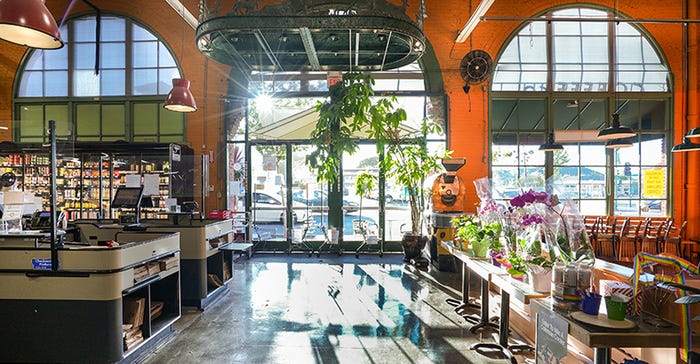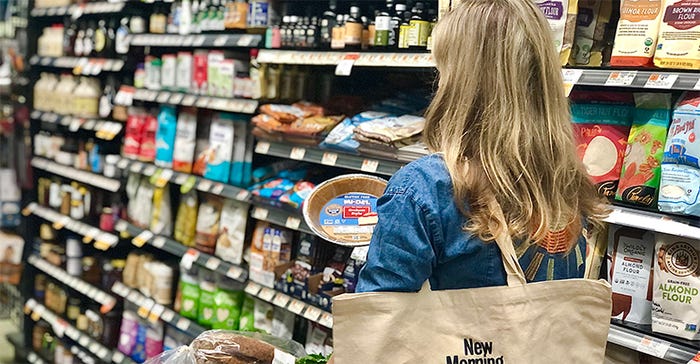
More than two years into the COVID-19 pandemic, natural foods retailers continue to wrestle with myriad fresh challenges, from adapting to severe supply chain problems to determining how—or whether—to serve prepared foods and stock steam tables with soups, stews, salads and stir fries.
Facets of change characterize the dizzying march of months for natural foods retailers. But at least one pillar of the industry remains constant: the keen need to differentiate.
As the natural foods industry during the past 50 years grew from a curious sideshow into a powerful, trend-setting force within the largest sector of the global economy—the food industry—mainstream supermarkets began going after natural retailer customers. A decade ago, their quest for natural foods customers was tentative; today, it’s full-throated.
The survival, if not prosperity, of natural retailers now depends in part on leaning into the vital features that set the industry apart—the qualities that not only first attracted people to the stores (and continue to draw them), but also keep them treading the aisles and filling canvas bags with organic kale.
Smaller retailers performed better throughout 2021
Overall, natural retailer sales experienced 1.4% growth during 2021, compared to 3.9% during 2020, according to data from Natural Foods Merchandiser’s annual Market Overview survey of natural retailers. Some ratcheting back of growth could stem from year-to-year declines at large natural chains that experienced stupendous growth during 2020. Sales at small natural retailers, which did not see the same levels of elevated expansion during 2020, witnessed more robust growth than large retailers during 2021.
Existential threats such as e-commerce enjoyed strong growth during 2021, but at a rate of 23%, sales amplification quieted dramatically from 2020’s 69% growth rate. Either way, at almost 10% of the market, online sales remain relatively petite and much of it is driven by non-food items.
When COVID emerged, retailers across the board, including natural grocery stores, worried the pandemic would steal business from brick and mortar, or that they would be forced to completely rearrange the way they do business. But the worry didn’t last long.
“We depend on relationships and trust. You don’t create that in an online shopping cart,” says Alan Lewis, vice president of advocacy at Natural Grocers by Vitamin Cottage, a Colorado-based natural foods retailer that owns more than 160 stores in 22 states. Store visits for Natural Grocers ballooned by double-digits during COVID, he says.
Jason Brainerd, purchasing director at New Morning Market in Woodbury, Connecticut, agrees: “We thought online sales would be a huge threat, once COVID landed. But we found that customers quickly became fed up with online. They wanted to shop in the store,” he shared during a Natural Foods Merchandiser retail roundtable discussion at Natural Products Expo West in March.
Pandemic created foundations for growth
As COVID-19 disrupted work, school and life in general from early 2020 through 2021, the pandemic changed what consumers bought and how they bought it. Sales of supplements, as well as online sales, grew rapidly in 2020 but dropped last year as vaccines became available and pandemic-related panic receded.
Yet, other aspects of the natural products industry notched sales growth in 2021: The beverage market grew more than 6%.
Regardless of the ups and downs within different sectors during a given year, at least three key foundations support the industry and differentiate it from supermarkets in strategically significant ways: community, innovation and integrity of standards. When natural foods retailers nail all of the above, chances for commercial success rise.
“Independent natural food grocers build trust with the people in our community by knowing they can trust we have the highest standards, and that we are invested in our neighbors’ well-being and the local economy,” says Kim Totzke, chief operating officer of Turnip Truck, which operates three stores in Nashville, Tennessee. “Also, as partners in the industry, we are on the forefront on innovation in building brands before you ever see them in a conventional store.”

Rooted in community
When Alex Rush-Woods began working at Alameda Natural Grocery in Oakland, California, 17 years ago, he was a punk rock musician looking for a bills-paying gig. His exposure to healthy foods was negligible. His knowledge about the industry, nil.

“We had a young lady from Bulgaria who asked about the new tropical punch flavor from Olipop, a brand that makes incredible sodas full of prebiotics,” he says. “I told her it was kind of like Hawaiian Punch and she had never tried it. I went out and got her an old-school Hawaiian Punch, full of high-fructose corn syrup, for a taste test. She loved the Olipop.”
It’s customer service like this, he says, that contributes to the sense of community that people encounter when shopping at Alameda Natural Grocery locations. All the managers have been with the store for at least 12 years, says Randall Owczarak, the general manager for East Bay Natural Grocers, the parent company for Alameda Natural Grocery, Castro Valley Natural Grocery and a food service operation. Deep experience like this, Owczarak says, does not characterize the typical grocery store, never mind the intense customer engagement and education that comes with working at a natural foods retailer.
The company’s stores work hard to meld with their communities, he says. They accept Electronic Benefits Transfer (EBT) cards for grocery transactions, for example, while many other stores reject them. They support grassroots organizations through cash register campaigns; one of the most successful was harm reduction education and needle exchanges for West Oakland Punks With Lunch. Through the nonprofit, all store managers now know how to administer Narcan to people who overdose on drugs.
“We’ve got to walk the talk,” says Owczarak. “We host beehives on our roof and have 12 different hives across the community. People who adopt hives get a couple gallons of honey out of it. We have ongoing sustainability projects and a sustainability coordinator. We now are trying a new initiative, paperless parties, where people have birthday parties and instead of disposable plates, cups and cutlery, we have place servings people can take to the park, and then return them.”
Turnip Truck serves its communities with space devoted for neighborhood events, a broad area called “the bridge” in the new flagship store that was an integral part of the architectural design. A few years ago, a huge storm wiped out power for people in the surrounding communities for weeks. The founder of Turnip Truck responded by renting a tractor trailer, plugging it into the building to generate power, and serving people coffee and hot meals while they charged phones and navigated their post-storm lives.
“We see ourselves as part of the community and as a service, rather than just a place to buy milk,” says Totzke.
When natural foods retailers succeed in nurturing strong community ties, the feel-good vibes often speak to more than pleasing customers; in many cases, the employees themselves radiate as much community enthusiasm as the people being served. “What’s necessary to bring joy is having passion about what you do,” says Jimbo Someck, owner of Jimbo’s Naturally, after the natural grocery in March accepted New Hope Network’s Joy Award. The award, part of New Hope Network’s Community Purpose and Impact Awards, recognizes people and organizations who move the natural products industry forward. “You work so hard, you want to enjoy what you’re doing because otherwise, it becomes work.” Someck, a native New Yorker, opened the first of his five San Diego, California-area stores in 1984.
Community for the stores is about more than connecting with customers about products and issues like sustainability. Making sure the stores reflect and serve their communities also are principal goals.
“There are four shelves of ramen, soba and other noodles, many I’ve never seen anywhere else,” says Alameda Natural Grocery’s Rush-Woods, describing the neighborhood as the very essence of the idea of the American melting pot. “We find that’s comforting for people.” The store also imports a wide range of exotic fruits, including Ataulfo mangoes, which Vietnamese customers especially prize.
Ensuring co
“In 2017 we were awarded the small business diversity award by the LGBT Chamber of Commerce,” Totzke says. “Intentional buying for representation of people of all race and sexual identity is just the right thing to do, and good business.”
Data from New Hope Network’s business insights group reveals that a common assumption about natural channel shoppers—that they’re mostly white, well-off moms—is far off the mark. In fact, shoppers are fairly evenly divided along gender lines; fewer than half are Caucasian; about 40% are affluent; and more than a third live in households with just two people.
Additionally, more than a quarter of natural channel shoppers are Hispanic and more than a third of Asian consumers are significantly more likely to shop at natural grocery stores; 36% of consumers who represent communities of color agree that products at natural retailers were, “made with me in mind” (compared to 32% of all retail customers combined); and Hispanic and Asian consumers specifically are more likely than all natural retail shoppers to agree that they are “willing to pay a premium for natural and organic foods and products” (44% vs. 36%).
The data offers valuable guidance for natural foods retailers, many of which are so busy with broken supply chain issues and bringing their shops back on new, COVID-laid tracks that they have little time to fully analyze the people passing through store doors every day. Many potential customers served by natural retailers are extremely diverse, and open to shopping anywhere that carries products that matter to them. Failing to appeal to local diverse, elderly or low-income communities, for example, amounts to lost connections and business.

Natural retail stores reflect their communities
At Alameda Natural Grocery, management works to appeal to its hyper-diverse community, among other things by making sure its employees reflect their communities. Hiring is intentional; the store seeks employees that represent the people in the neighborhoods.
“I was thinking about our front end the other day and realized that the three main employees were people of color,” Rush-Woods says. “Two black men and a Latina woman.”
The store also toils to bring in products that represent the community’s diversity. It sponsors an entire project devoted to diversity in products, led by the store’s advocacy and marketing directors. When they launched the project, the goal was to put hundreds of BIPOC-owned products on the shelves as soon as possible. The goal remains distant—the pandemic, he says, hindered progress. But the committee is delivering results.
Rush-Woods points toward Evolution Hot Sauce and Hella Tea as two BIPOC-owned brands that have become store favorites. The names for Hella Tea’s SKUS, for example, refer to rap songs and African American celebrities: HumpTEA Hump, Nothing But A Gangsta ParTEA, M. Tea Hammer and NipsTEA Hussle.
Products created by black-owned businesses receive stickers identifying them as such, he says.
Welcoming the community even touches the Alameda store’s soundtrack.
“I’ve got a Curtis Mayfield station I play,” says Rush-Woods, who is black. “I’ve had amazing moments with black folks coming in and saying, ‘Oh, this is Curtis, did you pick this?’ Yes, I did.”
Innovation: ‘A trove of shiny, new objects’
When vinyl records were mainstream, nobody visited a Kmart to find cutting-edge music. Instead, they spent afternoons flipping through bins of records at what then were hubs of cool: record stores.
The experience 
“We have customers ask us to tell them every time we have something new. They often are the influencers within their friend groups and what they want is the latest and greatest thing, and they will definitely ask questions,” says Jason Brainerd, director of purchasing at New Morning Market in Woodbury, Connecticut.
The importance of innovation to retailers figures into the decisions the beverage brand Rowdy Mermaid makes about new products, says Sheila Rosen, the Colorado company’s marketing director.
“We try to give our retail partners what we call innovation sneak peeks and invite them to weigh in early at the concept stage,” she says. “We want them to feel they are offering the product together with us and we will augment the final product with their input.”
Once the product is launched, Rowdy Mermaid invests heavily in merchandising, education and constant in-store demos, Rosen says.
“We love the independent stores. That is where the discovery happens, where people see the new ingredient,” she says. “Our customers love that journey. The natural retailers are a treasure trove of new and shiny objects.”
Rowdy Mermaid is just one of myriad brands that drove growth of healthy beverages—6.6%—in the natural sector during 2021, according to NFM’s survey data. As evidenced during Expo West in March, beverages drove intense innovation during the past year. With so much innovation, new product launches and rising consumer interest in everything from plant-based kefir to functional, mushroom-rich canned coffees, retailers see ripe opportunities in the highly competitive sector.

Innovation for good
The promise of innovation at natural retailers is about much more than fresh flavors and SKUs. Leading-edge product choices at traditional supermarkets tend to fix on sparkly novel offerings from international food corporations. But with natural retailers, most innovation comes from the ground up. The best of it incorporates advances for sustainability, human health and more—innovation with benefits.
The rapid rise of functional products is just one category in which innovation benefits people. The growing upcycled food movement—which features a new certification from the Upcycled Food Association—does its part for people and planet by working to reduce food waste.
But innovation at natural retailers doesn’t hinge entirely on the brand side. Retailers are always hunting for interesting ways to improve the shopping experience, promote products and attract customers to the stores. In the wake of COVID-19, some innovations are old-school: Rather than invest in technology, store owners simply improve the way they do business.
At New Morning Market, severe supply chain disruptions forced the shop to upend how it stocks products. The store now devotes far more time and resources into planning promotions, says Brainerd. It stocks more products in its warehouse than in the past.
“Up until now, you didn’t want to tie up cash in product,” Brainerd says. “But we now have to always carry two weeks of inventory, minimum. COVID taught us that once the supply chain breaks in one place, it breaks all the way down the line.”
Standards integrity—the industry’s core
Without commitment to standards, natural grocery stores wouldn’t exist. The very term “natural grocers” differentiates the retailers from supermarkets and corner stores: They aren’t just grocers, they are grocers that stock “natural” products.
Yes, the word “natural” lacks strict and rigorously enforced standards, but when stores began using the term, it conveyed intention rather than signified commitment to codified standards. Today, of course, a welter of standards and certifications infuses the products natural retailers carry. And the proliferation of certification-emblazoned products persists as a key advantage.
“We have people who live 45 minutes out of town and they come in to stock up on the things they need,” says Totzke, of Turnip Truck. “There are plenty of chains between them and us, but they trust the integrity of our products.”
Oversight of standards integrity is a constant pursuit at New Morning Market, Brainerd says.
Consider a popular cheese puff brand that got its start on natural retailer shelves and has graced them for years. Brainerd says the puffs were huge sellers for New Morning. But earlier this year, a customer pointed out the company had changed the source of its corn—it no longer was exclusively non-GMO corn.
“That was a big no for us. We phased it out of the store and are looking for other brands to replace it,” he says. “Customers ask about it all the time, and when they learn, they’re glad we got rid of it. They don’t say, ‘Oh, no, can you bring it back?’”
For many natural grocery stores, commitment to standards is complex and always evolving due to the constant appearance of new certifications and symbols, as well as various innovations entering the sustainable products space. Creating meaningful and consequential symbols requires quite a bit of effort and time, but advocates for different environmental, social and cultural movements constantly come up with novel ones. When they are well done—for example, backed by third parties—they make a difference.
“When you have a large group of retailers with an aligned voice saying, ‘We won’t carry GMOs on our shelves,’ the whole industry responds to it,” says Corinne Shindelar, founder of the natural foods consultancy All Natural Strategies in Minneapolis, Minnesota, and former president and CEO of the Independent Natural Food Retailers Association (INFRA). “A lot of the small voices can be so impactful. We can say, ‘This is what we want for the future,’ and the supply chain responds.”
New standard makes first Expo appearance

Now, more than 200 companies emblazon their products with the UFA seal, with more in the pipeline. The UFA’s booth at Expo was a buzzing hive of activity; Wyatt says many more companies became interested in the movement during Expo West.
It took close to two years of work to turn the idea into a standard, complete with third-party certification, rigorous standards and protocols and a seal for brands.
“I thought I was going to drop to my knees and cry the first time I saw my certification in the wild,” says Wyatt. “Retailers have the highest access to consumers, which is why Expo West had 60,000 people in March. It’s why, for many brands, their greatest dream is to have an endcap. Retailers are the portal, the gateway to consumers.”
Alt meat sparks debate, review
One rising issue in the industry is the intersection of standards and alternative meat products. For some alt-meats, controversy is absent: Frozen burger patties made from whole vegetables, for example, are straightforward. But the 2.0 version of alt-meats includes products that involve a fair bit of engineering, such as the use of precision fermentation. The products have raised alarms in the industry.
Shindelar, the former INFRA president and CEO, says the lab-born meats are beginning to force the industry to grapple with a swiftly growing market, one that potentially offers financial rewards for natural grocers, but also could threaten the industry’s reputation for maintaining high standards.
“This is where people want to play right now,” she says. “The next five years are going to be really influential and substantial in terms of how we shape the future. We have to have a hard dialogue.”
At Natural Grocers, all such alternative products are prohibited, says Lewis. “If there are any ingredients that suggest they are the result of [synthetic biology], then we require full supply chain visibility,” he says. “For us, this is a banned method of production.”
Totzke at Turnip Truck says concern about alt-meats is just “starting to catch some wind” with store management and customers. For now, it’s in the background. But she anticipates more advocacy surrounding it and is eager for industry conversations and education about the rapidly expanding industry.
“This is the kind of thing that we talk about at Expo, and that’s why it matters—to collaborate over things like this,” she says. “By constantly communicating, we can make sure everyone is sticking to best practices and can make informed decisions for themselves. That’s one important way that we separate ourselves from conventional. This is our core values. This is our integrity.”
About the Author(s)
You May Also Like
.png?width=700&auto=webp&quality=80&disable=upscale)




